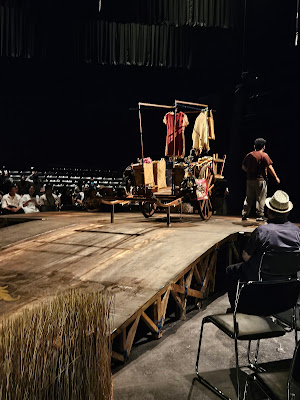November 30, 2024
She was a published author who is working on her next book. One day, she received a message asking her if she would consider taking over to write the online advice column, "Dear Sugar." After an initial hesitation, she accepted, even when she was told that she was not going to earn any money out of this gig. Once she began writing her advice for the letters sent to "Sugar," loyal readers recognized that it was a new person behind the pseudonym.
The source book "Tiny Beautiful Things" is a compilation of selected essays written by Cheryl Strayed (author of "Wild: From Lost to Found on the Pacific Crest Trail") for her advice column published the online literary magazine "Rumpus" from 2010 to 2012. Nia Vardalos (of "My Big Fat Greek Wedding" fame) adapted and developed these essays into a play in 2016, for which she herself originated the lead role of anonymous advice columnist Sugar.
For this play staged by The Sandbox Collective under the direction of Jenny Jamora, lead actress Iza Calzado plays Sugar who typed her column on her laptop on her dining room table. She got to interact with various letter-writers as embodied by three other actors (Rody Vera, Gabby Pineda, Ketchup Eusebio, with alternates Brian Sy and Regina de Vera), who went in and out and around the different areas of her house (designed by Kayla Teodoro).
The topics of the letters ran the gamut of personal problems -- from light trivial to profoundly serious. Sugar drew from her own life experiences to try to clarify issues. Some memorable letters involved how to know when what one felt about someone was love, how to tell a good spouse that he wants a divorce, how to tell a new partner about a history of sexual assault, or how to make sense of a senseless death of a son. Heavy stuff, frank language.
The letter writers in the show I watched were: prolific playwright Rody Vera (whom I had never seen act in an English play before, and cursing to boot!), Gabby Padilla (effortlessly transitioning from her indie films to the stage for the second time this year), and Bryan Sy (internally intense as ever, you wouldn't know he was covering for film/TV actor Ketchup Eusebio). Too bad there were occasional mic issues which made some lines unclear.
The main spotlight rested on elegant Ms. Iza Calzado, who was onstage for practically the entire 1 hour-50 minute run time. Her delivery of Sugar's lengthy, complicated lines was clear and flawless, very impressive for one playing lead in her very first stage production. She paced her emotions well as the intensity of the problems escalated, peaking in that cathartic, excellently-composed 24-point response to a most excruciating question at the climax.
**********
"Tiny Beautiful Things" runs at the Power Mac Black Box Theater at Circuit Makati, from November 16 to December 8, 2024, with evening shows at 7:30 pm, and matinees at 3 pm on Saturdays and Sundays.







